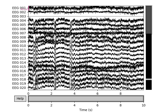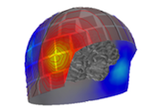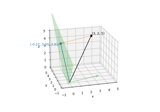mne.set_eeg_reference¶
- mne.set_eeg_reference(inst, ref_channels='average', copy=True, projection=False, ch_type='auto', forward=None, verbose=None)[source]¶
Specify which reference to use for EEG data.
Use this function to explicitly specify the desired reference for EEG. This can be either an existing electrode or a new virtual channel. This function will re-reference the data according to the desired reference.
- Parameters
- instinstance of
Raw|Epochs|Evoked Instance of Raw or Epochs with EEG channels and reference channel(s).
- ref_channels
listofstr|str Can be:
The name(s) of the channel(s) used to construct the reference.
'average'to apply an average reference (default)'REST'to use the Reference Electrode Standardization Technique infinity reference 1.An empty list, in which case MNE will not attempt any re-referencing of the data
- copybool
Specifies whether the data will be copied (True) or modified in-place (False). Defaults to True.
- projectionbool
If
ref_channels='average'this argument specifies if the average reference should be computed as a projection (True) or not (False; default). Ifprojection=True, the average reference is added as a projection and is not applied to the data (it can be applied afterwards with theapply_projmethod). Ifprojection=False, the average reference is directly applied to the data. Ifref_channelsis not'average',projectionmust be set toFalse(the default in this case).- ch_type‘auto’ | ‘eeg’ | ‘ecog’ | ‘seeg’ | ‘dbs’
The name of the channel type to apply the reference to. If ‘auto’, the first channel type of eeg, ecog, seeg or dbs that is found (in that order) will be selected.
New in version 0.19.
- forwardinstance of
Forward|None Forward solution to use. Only used with
ref_channels='REST'.New in version 0.21.
- verbosebool,
str,int, orNone If not None, override default verbose level (see
mne.verbose()and Logging documentation for more). If used, it should be passed as a keyword-argument only.
- instinstance of
- Returns
- instinstance of
Raw|Epochs|Evoked Data with EEG channels re-referenced. If
ref_channels='average'andprojection=Truea projection will be added instead of directly re-referencing the data.- ref_data
array Array of reference data subtracted from EEG channels. This will be
Noneifprojection=Trueorref_channels='REST'.
- instinstance of
See also
mne.set_bipolar_referenceConvenience function for creating bipolar references.
Notes
Some common referencing schemes and the corresponding value for the
ref_channelsparameter:- Average reference:
A new virtual reference electrode is created by averaging the current EEG signal by setting
ref_channels='average'. Bad EEG channels are automatically excluded if they are properly set ininfo['bads'].
- A single electrode:
Set
ref_channelsto a list containing the name of the channel that will act as the new reference, for exampleref_channels=['Cz'].
- The mean of multiple electrodes:
A new virtual reference electrode is created by computing the average of the current EEG signal recorded from two or more selected channels. Set
ref_channelsto a list of channel names, indicating which channels to use. For example, to apply an average mastoid reference, when using the 10-20 naming scheme, setref_channels=['M1', 'M2'].
- REST
The given EEG electrodes are referenced to a point at infinity using the lead fields in
forward, which helps standardize the signals.
If a reference is requested that is not the average reference, this function removes any pre-existing average reference projections.
During source localization, the EEG signal should have an average reference.
In order to apply a reference, the data must be preloaded. This is not necessary if
ref_channels='average'andprojection=True.For an average or REST reference, bad EEG channels are automatically excluded if they are properly set in
info['bads'].
New in version 0.9.0.
References
- 1
D. Yao. A method to standardize a reference of scalp EEG recordings to a point at infinity. Physiological Measurement, 22(4):693–711, 2001. doi:10.1088/0967-3334/22/4/305.


